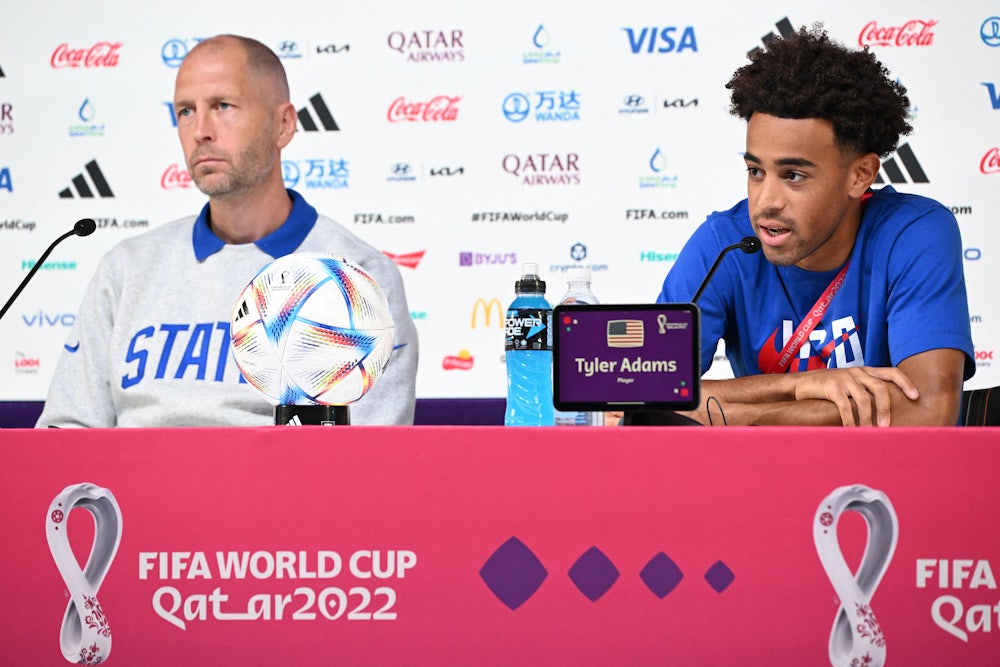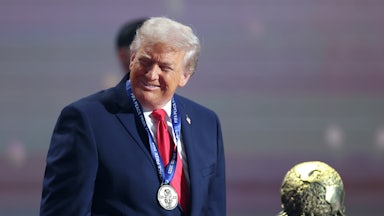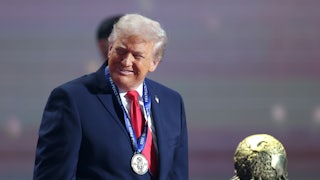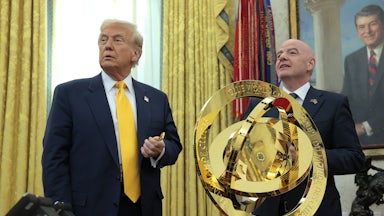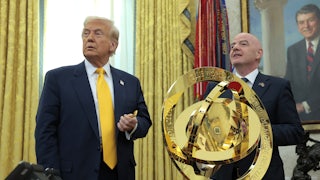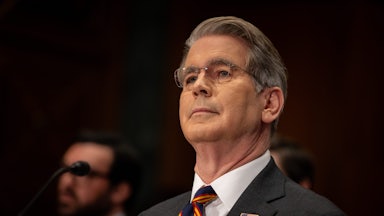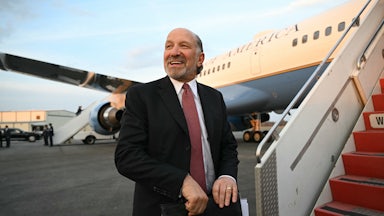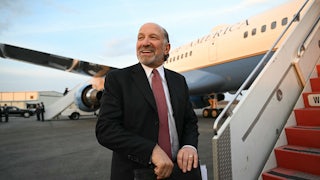When the United States men’s national team faces off against Iran in the World Cup Tuesday, it will be after days of rising tensions related to this particular match. A day earlier Gregg Berhalter, the U.S. men’s coach, alongside U.S. team captain Tyler Adams, was peppered by Iranian reporters on whether representing the U.S. while criticizing Iran was hypocritical and whether the U.S. players were involved in the U.S. Soccer Federation altering images of the Iranian flag on social media.
The questioning is not entirely based on soccer-related events. For months Iran has been experiencing massive protests sparked by the death of Mahsa Amini, a young woman who was arrested and beaten for allegedly violating the country’s law mandating that women wear headscarves. Iran’s government has responded with a violent crackdown of the protests, which the Biden administration has condemned. Members of the Iranian soccer team publicly expressed solidarity with the ongoing protests last week when they refrained from singing their country’s national anthem during their match against England. Since then, the Iranian players and their families have been under extreme pressure from conservatives in Iran to sing the anthem in subsequent games, and the players’ family members have been threatened with arrest or even torture. On top of that, tensions between Iran and the U.S. in the World Cup go back decades.
So the scrutiny over every aspect of this game will be intense. If the U.S. loses, it will go home. Even a tie won’t be enough for the team, which failed to qualify at all for the 2018 tournament.
I got on the phone with Stefan Szymanski, a professor of sport management at the University of Michigan and the author of multiple books on soccer, to talk about the stakes in this game and the geopolitical backdrop. Below is a condensed transcript of our conversation.
It feels like you have two teams facing off with larger geopolitical forces looming in the background. It feels, to me, a little like the “Miracle on Ice” matchup between the United States and Russia at the 1980 Olympics. I was wondering if you could talk about what tomorrow means and what happens when there’s an intersection of politics like this and geopolitics.
It’s interesting that you raise the Miracle on Ice because in some ways it’s slightly different. First thing I’ll say is the importance of this is because you are hosting the next men’s World Cup, and a good showing by the national team is important in selling back to the U.S. where, let’s face it, the women are completely dominant and the men are somewhat less than that. If [they] don’t go through, then I think that’s sort of a buzzkill for U.S. men’s soccer.
For the Iranians, again, obviously defeating the Great Satan is going to be imperative, but I would liken this a little bit to Argentina in 1978. The point about that was most Argentinians were not happy with being ruled by a military dictatorship, or a very large fraction of them were not. And it was a dictatorship that was committing appalling atrocities. But Argentinians could not stop themselves from celebrating that they went out and won the World Cup. Like it or not, that did help to prolong the Argentine junta for several more years because they basked in the refracted glory of that. I think that’s going to be the same if Iran wins. So on the one hand you’ve got the Iranian players who have made it very clear that they are protesting the regime. On the other hand, if the Iranian national team is winning, then that tends to damp down public protest. It shouldn’t but it does. If Iran loses, then that’s bad for the Iranian regime.
The difference with the Miracle on Ice is I don’t think there was any love lost between the players of the Miracle on Ice. You might almost imagine the American and the Iranian players embracing before the game in some show of solidarity and saying, “The political moment is we, the American men, actually are in solidarity with, you the Iranians, who hate your regime.”
Again, I don’t know what FIFA and Qatar want out of this as well because they obviously are dead set against public protest and are threatening the Iranian team for their protests. So it’s a strange mishmash about this one.
Can you talk about what’s been going on in the background with having the World Cup in Qatar and especially in the past few days with the brief removal of the Iranian logo from some social media images?
Right, this was a very interesting thing. So the U.S. Soccer Federation on their website displayed the Iranian flag without the Islamic symbol that’s in the middle of the flag. So essentially, it’s dissing the regime, leading the Iranians to demand that FIFA exclude them from the World Cup for disrespecting the Iranians, which is sort of funny when you think of how many American flags get burned in Tehran. Interesting that the U.S. Soccer Federation was getting itself involved in politics. It was poking Iran with a stick.
Is this a situation where the players really have to weigh in on the protesters in Iran?
Have you followed the thing about the armbands?
The gay rights armbands?
Yeah. So the European teams wanted to have those, and FIFA essentially threatened them that they would get yellow-carded at least if they wore them. So FIFA was using sporting sanctions to prevent political protest from taking place. So any player who engages in any kind of political protest is likely to face some kind of sanction.
Now, of course, the one time when you are really going to be effectively able to engage in serious political protest is when you’re knocked out of the World Cup. So whoever loses has a golden opportunity to say what they really think about what’s going on. Personally, I’m hoping a lot of these teams, when they get knocked out, are going to have lots of political statements. But it’s very clear that they’re not going to do anything while their teams are still in the competition.
What does it say if Iran wins and what does it say if the U.S. wins? And Iran’s soccer team isn’t particularly good on the world stage, are they?
Well, the interesting thing is in terms of the FIFA rankings, the U.S. and Iran are pretty equal. It should be a very good game of soccer. So in that sense win or lose I don’t think it’s a big upset in the history of soccer. I think whenever Iran gets knocked out the players will make an even bigger protest than they’ve already made. They may do something ahead of the game.
Really?
Well, they’ve been the bravest so far. The first thing to watch is the national anthem. Do the Iranian players sing the national anthem? One of the leading players has made some public statements about the regime. At the end of the game, if they lose they’ll have something to say.
Again, if the Americans lose they might well use the platform of that stage before they leave to give a press conference about the whole thing because it’s not just about Iran and the U.S.A. It’s also about human rights in Qatar and the appalling censorship by FIFA and this complete hypocrisy about the World Cup welcoming everyone when they’re plainly not. Everyone’s plainly not welcome to the World Cup. So again, it’s going to be interesting to see if anything gets said along those lines.
Is there anything else you think that’s important to watch in the coming days?
Well, there is the thousand-year-old rivalry between England and Wales. The Welsh have had a nationalist party for 50 years. The Welsh have made quite good progress toward developing a nationalist party. They’ve revived the Welsh language. Linguists talk about this a lot because it’s not easy to revive a language that was dead 50 years ago. They could win three-nil and keep England out, and Wales go on to glory.
